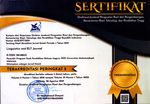Students Attitudes Toward the Use of Artificial Intelligence Tools in English Language Learning
Abstract
This research intends to assess the point of view of English Education students of Universitas Negeri Makassar regarding the application of Artificial intelligence (AI) resources in the skin of language learning. In this context, the research may engage AI tools Grammarly, ChatGPT, and others and analyze both the benefits and the challenges associated with these applications. The study adopted a convergent parallel design and collected qualitative and quantitative data from 100 respondents through surveys and interviews. The findings revealed that using AI tools increases learning efficiency (89%), enhances writing (82%), and boosts students’ self-efficacy toward completing academic work (75%). Nonetheless, difficulties such as excessive dependence on AI, lack of comprehension of the functionalities of the specified tools, to mention a few, and the problem of depending on the accuracy of responses generated by AI were also documented. In addition, the research brings attention to the potential of AI in language education while stressing the importance of integration to avoid dependence. It is recommended for educators to reinforce responsible use of AI, discourage misuse of AI, uphold academic honesty, and discourage autonomous use of AI. In the next strides, the study will require other attention in the areas of most interest when using AI tool inclusion measures better aimed at addressing the barriers identified impacting the use of language tools for students.
Keywords
Full Text:
PDFReferences
S. Mavridi, ‘Master’s degree programmes and the development of language teacher TEL expertise in times of digital transformation’, Stud. Technol. Enhanc. Learn., vol. 3, no. 2, 2023.
X. Deng and Z. Yu, ‘A systematic review of machine-translation-assisted language learning for sustainable education’, Sustainability, vol. 14, no. 13, p. 7598, 2022.
A. A.-A. M. Al-Othman, ‘Using artificial intelligence in English as a foreign language classrooms: Ethical concerns and future prospects’, 2024.
J. H. Woo and H. Choi, ‘Systematic review for AI-based language learning tools’, arXiv Prepr. arXiv2111.04455, 2021.
D. Fontenelle-Tereshchuk, ‘Academic writing and ChatGPT: Students transitioning into college in the shadow of the COVID-19 pandemic’, Discov. Educ., vol. 3, no. 1, p. 6, 2024.
N. Hockly, ‘Artificial intelligence in English language teaching: The good, the bad and the ugly’, Relc J., vol. 54, no. 2, pp. 445–451, 2023.
R. J. Campado, C. M. D. Toquero, and D. M. Ulanday, ‘Integration of assistive technology in teaching learners with special educational needs and disabilities in the Philippines’, Int. J. Prof. Dev. Learn. Learn., vol. 5, no. 1, p. ep2308, 2023.
T. A. Cullen and B. A. Greene, ‘Preservice teachers’ beliefs, attitudes, and motivation about technology integration’, J. Educ. Comput. Res., vol. 45, no. 1, pp. 29–47, 2011.
K. Higgins, J. Huscroft-D’Angelo, and L. Crawford, ‘Effects of technology in mathematics on achievement, motivation, and attitude: A meta-analysis’, J. Educ. Comput. Res., vol. 57, no. 2, pp. 283–319, 2019.
C. Song and Y. Song, ‘Enhancing academic writing skills and motivation: assessing the efficacy of ChatGPT in AI-assisted language learning for EFL students’, Front. Psychol., vol. 14, p. 1260843, 2023.
Y. N. Enzelina, M. H. Santosa, and A. A. G. Y. Paramartha, ‘Exploring English Language Education Major University Lecturers’ and Students’ Perceptions of AI-Based Applications in Post-Pandemic Learning’, SALEE Study Appl. Linguist. English Educ., vol. 4, no. 2, pp. 487–502, 2023.
W. Zhou, ‘Sociocultural theory and its implications in college English teaching and learning in the age of artificial intelligence’, in Journal of Physics: Conference Series, IOP Publishing, 2020, p. 12142.
L. Chen, P. Chen, and Z. Lin, ‘Artificial intelligence in education: A review’, Ieee Access, vol. 8, pp. 75264–75278, 2020.
T. R. A. Mukhallafi, ‘Using artificial intelligence for developing English language teaching/learning: an analytical study from university students’ perspective’, Int. J. English Linguist., vol. 10, no. 6, p. 40, 2020.
R. Indahyanti, ‘Lecturer voices toward future English language teaching: Augmented reality (AR) and artificial intelligence (AI)’, Expo. J. Pendidik. Bhs. Ingg., vol. 8, no. 2, pp. 203–214, 2019.
V. Rosmayanti, ‘Exploring Pre- Service Teachers ’ View on the Implementation of Virtual Internship Program during’, in The fist ELESPIC Proceedings, 2021, pp. 65–74.
D. Baranwal, ‘A Systematic Review of Exploring the Potential of Teachable Agents in English Learning.’, Pedagog. Res., vol. 7, no. 1, 2022.
V. Braun and V. Clarke, Successful Qualitative Research. London: Sage Publications, Inc., 2013.
N. Nazari, M. S. Shabbir, and R. Setiawan, ‘Application of Artificial Intelligence powered digital writing assistant in higher education: randomized controlled trial’, Heliyon, vol. 7, no. 5, 2021.
O. Zawacki-Richter, V. I. Marín, M. Bond, and F. Gouverneur, ‘Systematic review of research on artificial intelligence applications in higher education–where are the educators?’, Int. J. Educ. Technol. High. Educ., vol. 16, no. 1, pp. 1–27, 2019.
Y. Dong, ‘Revolutionizing academic English writing through AI-powered pedagogy: practical exploration of teaching process and assessment’, J. High. Educ. Res., vol. 4, no. 2, p. 52, 2023.
W. Sun, ‘The impact of automatic speech recognition technology on second language pronunciation and speaking skills of EFL learners: a mixed methods investigation’, Front. Psychol., vol. 14, p. 1210187, 2023.
M. Liu, ‘Exploring the application of artificial intelligence in foreign language teaching: Challenges and future development’, in SHS Web of Conferences, EDP Sciences, 2023, p. 3025.
J. Chen, P. Lai, A. Chan, V. Man, and C.-H. Chan, ‘AI-assisted enhancement of student presentation skills: Challenges and opportunities’, Sustainability, vol. 15, no. 1, p. 196, 2022.
A. Carobene, A. Padoan, F. Cabitza, G. Banfi, and M. Plebani, ‘Rising adoption of artificial intelligence in scientific publishing: evaluating the role, risks, and ethical implications in paper drafting and review process’, Clin. Chem. Lab. Med., vol. 62, no. 5, pp. 835–843, 2024.
Q. Ju, ‘Experimental Evidence on Negative Impact of Generative AI on Scientific Learning Outcomes’, arXiv Prepr. arXiv2311.05629, 2023.
J. Steiss et al., ‘Comparing the quality of human and ChatGPT feedback of students’ writing’, Learn. Instr., vol. 91, p. 101894, 2024.
S. Lin and P. Crosthwaite, ‘The grass is not always greener: Teacher vs. GPT-assisted written corrective feedback’, System, vol. 127, p. 103529, 2024.
X. Wu, ‘Dynamic evaluation of college English writing ability based on AI technology’, J. Intell. Syst., vol. 31, no. 1, pp. 298–309, 2022.
I. Straume and C. Anson, ‘Amazement and trepidation: Implications of AI-based natural language production for the teaching of writing’, J. Acad. Writ., vol. 12, no. 1, pp. 1–9, 2022.
M. Perkins, J. Roe, D. Postma, J. McGaughran, and D. Hickerson, ‘Game of tones: faculty detection of GPT-4 generated content in university assessments’, arXiv Prepr. arXiv2305.18081, 2023.
R. Grieve, J. Woodley, S. E. Hunt, and A. McKay, ‘Student fears of oral presentations and public speaking in higher education: a qualitative survey’, J. Furth. High. Educ., vol. 45, no. 9, pp. 1281–1293, 2021.
A. S. M. Selim, ‘The Transformative Impact of AI-Powered Tools on Academic Writing: Perspectives of EFL University Students’, Int. J. English Linguist., vol. 14, no. 1, p. 14, 2024, doi: 10.5539/ijel.v14n1p14.
C. Mun, ‘EFL Learners’ English Writing Feedback and Their Perception of Using ChatGPT’, Stem J., vol. 25, no. 2, pp. 26–39, 2024, doi: 10.16875/stem.2024.25.2.26.
D. Miranty, U. Widiati, B. Y. Cahyono, and T. I. Suzila, ‘Automated Writing Evaluation Tools for Indonesian Undergraduate English as a Foreign Language Students’ Writing’, Int. J. Eval. Res. Educ., vol. 12, no. 3, p. 1705, 2023, doi: 10.11591/ijere.v12i3.24958.
W. Alharbi, ‘AI in the Foreign Language Classroom: A Pedagogical Overview of Automated Writing Assistance Tools’, Educ. Res. Int., vol. 2023, pp. 1–15, 2023, doi: 10.1155/2023/4253331.
M. Y. M. Amin, ‘AI and chat GPT in language teaching: Enhancing EFL classroom support and transforming assessment techniques’, Int. J. High. Educ. Pedagog., vol. 4, no. 4, pp. 1–15, 2023.
S.-C. Kong, ‘A Pedagogical Design for Self-Regulated Learning in Academic Writing Using Text-Based Generative Artificial Intelligence Tools: 6-P Pedagogy of Plan, Prompt, Preview, Produce, Peer-Review, Portfolio-Tracking’, Res. Pract. Technol. Enhanc. Learn., vol. 19, p. 30, 2024, doi: 10.58459/rptel.2024.19030.
Z. Bahroun, ‘Transforming Education: A Comprehensive Review of Generative Artificial Intelligence in Educational Settings Through Bibliometric and Content Analysis’, Sustainability, vol. 15, no. 17, p. 12983, 2023, doi: 10.3390/su151712983.
B. Lund, T. Wang, N. R. Mannuru, B. Nie, S. R. Shimray, and Z. Wang, ‘ChatGPTand a New Academic Reality:Artificial Intelligence‐writtenresearch Papers and the Ethics of the Large Language Models in Scholarly Publishing’, J. Assoc. Inf. Sci. Technol., vol. 74, no. 5, pp. 570–581, 2023, doi: 10.1002/asi.24750.
A. Ahn, ‘Should Academics Be Concerned About Articles Written by ChatGPT?’, Dev. Heal. Sci., vol. 7, no. 1, pp. 25–27, 2024, doi: 10.1556/2066.2024.00062.
R. Al-Jarf, ‘Students’ Assignments and Research Papers Generated by AI: Arab Instructors’ Views’, J. Comput. Sci. Technol. Stud., vol. 6, no. 2, pp. 92–98, 2024, doi: 10.32996/jcsts.2024.6.2.11.
A. Strzelecki, ‘Students’ Acceptance of ChatGPT in Higher Education: An Extended Unified Theory of Acceptance and Use of Technology’, Innov. High. Educ., vol. 49, no. 2, pp. 223–245, 2023, doi: 10.1007/s10755-023-09686-1.
J. Belda-Medina, ‘AI-Driven Digital Storytelling: A Strategy for Creating English as a Foreign Language (EFL) Materials’, Int. J. Linguist. Stud., vol. 4, no. 1, pp. 40–49, 2024, doi: 10.32996/ijls.2024.4.1.4.
X. Xu, X. Wang, Y. Zhang, and R. Zheng, ‘Applying ChatGPT to tackle the side effects of personal learning environments from learner and learning perspective: An interview of experts in higher education’, PLoS One, vol. 19, no. 1, p. e0295646, 2024.
C. Xiao, S. X. Xu, K. Zhang, Y. Wang, and L. Xia, ‘Evaluating reading comprehension exercises generated by LLMs: A showcase of ChatGPT in education applications’, in Proceedings of the 18th Workshop on Innovative Use of NLP for Building Educational Applications (BEA 2023), 2023, pp. 610–625.
O. Koraishi, ‘Teaching English in the age of AI: Embracing ChatGPT to optimize EFL materials and assessment’, Lang. Educ. Technol., vol. 3, no. 1, 2023.
H. H. Hieu, ‘Exploring the Impact of AI in Language Education: Vietnamese EFL Teachers’ Views on Using ChatGPT for Fairy Tale Retelling Tasks’, Int. J. Learn. Teach. Educ. Res., vol. 23, no. 3, pp. 486–503, 2024, doi: 10.26803/ijlter.23.3.24.
X. Zhou, ‘Unveiling Students’ Experiences and Perceptions of Artificial Intelligence Usage in Higher Education’, J. Univ. Teach. Learn. Pract., vol. 21, no. 06, 2024, doi: 10.53761/xzjprb23.
R. Godwin-Jones, ‘Generative AI, Pragmatics, and Authenticity in Second Language Learning’, 2024.
S. Hutt et al., ‘Feedback on Feedback: Comparing Classic Natural Language Processing and Generative AI to Evaluate Peer Feedback’, in Proceedings of the 14th Learning Analytics and Knowledge Conference, 2024, pp. 55–65.
R. Akbarani, ‘Use of Artificial Intelligence in English Language Teaching’, Int. J. English Learn. Appl. Linguist., vol. 4, no. 1, pp. 14–23, 2024, doi: 10.21111/ijelal.v4i1.10756.
Y. Lai, ‘The Impact of AI-Driven Narrative Generation, Exemplified by ChatGPT, on the Preservation of Human Creative Originality and Uniqueness’, Lect. Notes Educ. Psychol. Public Media, vol. 26, no. 1, pp. 121–124, 2023, doi: 10.54254/2753-7048/26/20230865.
G. M. Idroes, ‘Student Perspectives on the Role of Artificial Intelligence in Education: A Survey-Based Analysis’, J. Educ. Manag. Learn., vol. 1, no. 1, pp. 8–15, 2023, doi: 10.60084/jeml.v1i1.58.
DOI: https://doi.org/10.31764/leltj.v12i2.28840
Refbacks
- There are currently no refbacks.
Copyright (c) 2024 Vivit Rosmayanti

This work is licensed under a Creative Commons Attribution-ShareAlike 4.0 International License.
_____________________________________________________
Linguistics and ELT Journal
p-ISSN 2339-2940 | e-ISSN 2614-8633

LELTJ is licensed under a Creative Commons Attribution-ShareAlike 4.0 International License.
_____________________________________________________
LELTJ is abstracting & indexing in the following databases:
_____________________________________________________
LELTJ Editorial Office:













